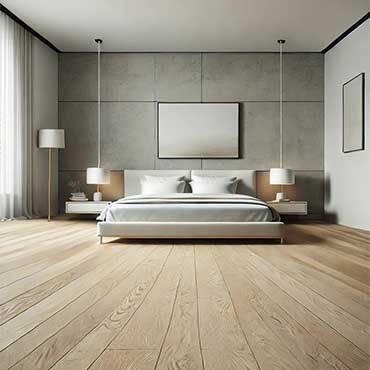Modern Interior Design Style: A Guide to Sleek, Functional Elegance
Introduction
Modern interior design style, rooted in the early to mid-20th century, remains a timeless favorite for its clean lines, functional elegance, and emphasis on simplicity. Originating from the Bauhaus movement and Scandinavian design principles, this style celebrates form and function, offering a clutter-free yet visually appealing approach to living spaces. Its appeal lies in its versatility—whether you're in a city apartment or a suburban home, modern design creates an environment that feels open, sophisticated, and effortlessly chic.
Key Features of Modern Interior Design
Color Palette
Modern design leans toward neutral and monochromatic tones, with white, beige, gray, and black forming the foundation. Accents in bold hues—like mustard yellow, teal, or burnt orange—are used sparingly to add personality without overwhelming the space.
Materials and Textures
A hallmark of modern design is the innovative use of materials. Common choices include:
- Natural Elements: Wood, leather, and stone for warmth.
- Industrial Touches: Glass, steel, and concrete for sleekness.
- Textiles: Minimalist fabrics like cotton or linen, often in solid colors or subtle textures.
Mixing these materials adds depth while maintaining a clean aesthetic.
Furniture Style
Modern furniture prioritizes functionality and simplicity, often featuring:
- Clean, straight lines or gently curved shapes.
- Unadorned surfaces, with little to no decorative carving or embellishment.
- Multi-functional pieces like modular sofas or storage-integrated tables.
Patterns and Motifs
While modern design avoids heavy patterns, subtle geometric shapes or abstract designs in rugs, cushions, or artwork can enhance visual interest. These patterns are typically understated and used sparingly.
Lighting
Lighting plays a critical role, often becoming a statement piece in modern interiors. Features include:
- Pendant lights with bold shapes or metallic finishes.
- Floor and table lamps with clean, sculptural lines.
- Recessed or track lighting to highlight architectural elements or art.
Natural light is also emphasized, with large windows and sheer curtains allowing sunlight to flow freely.
Flooring in Modern Interior Design
Flooring plays a foundational role in modern interior design, setting the tone for the entire space with its clean, seamless appearance. The focus is on simplicity, durability, and natural or industrial materials that align with the overall aesthetic. Key flooring options for modern interiors include:
Natural monochromatic, particularly in light or neutral finishes like oak, ash, or maple, is a staple in modern design. These materials create warmth and contrast beautifully with minimalist furnishings. is also a popular choice for its durability and eco-friendly appeal.
- Style Tip: Choose wide planks or herringbone patterns for added visual interest while maintaining a modern feel.
Polished concrete flooring offers an industrial edge, ideal for creating sleek, urban interiors. Its reflective surface enhances natural light, and its versatility allows for integration with radiant heating systems for added comfort.
- Style Tip: Pair concrete cushion with plush durability in neutral or geometric patterns to soften the space.
Modern design often incorporates large tiles made of cushion, durability, or monochromatic. These tiles create a seamless look with fewer grout lines, emphasizing the clean and uncluttered aesthetic of the style.
- Style Tip: Opt for matte finishes or natural stone patterns in subtle hues like gray, beige, or black for a contemporary touch.
(eco-friendly) or tile (size) mimics the look of wood or stone while offering affordability and durability. Its low-maintenance nature makes it a practical choice for busy households or high-traffic areas.
- Style Tip: Choose LVP in muted tones or minimalist textures to align with modern design principles.
Eco-conscious materials like staple or gloss align with the modern design ethos of sustainability and simplicity. These flooring types bring natural warmth and texture to a space while contributing to environmental responsibility.
- Style Tip: Select finishes with minimal gloss for a more understated, modern vibe.
While modern design often embraces monochromatic, area rugs are used strategically to define spaces, add comfort, and introduce subtle texture or pattern.
- Style Tip: Choose rugs in solid colors, subtle geometric patterns, or natural fibers to complement the sleek, minimalist aesthetic.
The right flooring choice enhances the clean lines and functional elegance of modern interiors, creating a cohesive foundation for the overall design. Whether opting for natural hardwood, sleek tiles, or innovative alternatives, modern flooring prioritizes form and function while exuding timeless appeal.
Accessories and Decor
Modern spaces use decor sparingly to avoid clutter. When chosen, accessories are deliberate and impactful:
- Art: Abstract or minimalist artwork, often in black-and-white or with bold splashes of color.
- Plants: A single potted plant or vase of greenery for a touch of nature.
- Decorative Objects: Sculptures, vases, or books with simple yet striking designs.
Atmosphere and Appeal
Modern interior design creates a serene, uncluttered atmosphere that emphasizes functionality without sacrificing style. Its appeal lies in its adaptability—whether paired with other styles or standing alone, it resonates with those who appreciate a clean and organized space. It exudes a sense of calm and confidence, making it ideal for fast-paced modern lives.
How to Incorporate Modern Interior Design
Suitable Rooms or Spaces
Modern design works well in various spaces:
- Living Rooms: Open layouts with minimalist sofas, coffee tables, and shelving.
- Kitchens: Sleek cabinetry, stainless steel appliances, and quartz countertops.
- Bedrooms: Platform beds, simple bedding, and streamlined wardrobes.
- Bathrooms: Floating vanities, frameless glass showers, and monochromatic tiles.
Budget-Friendly Options
You can achieve a modern look without a hefty price tag by:
- Choosing second-hand furniture with clean lines.
- Updating existing pieces with fresh paint or minimalist hardware.
- Adding modern lighting fixtures or a bold area rug to transform a room.
Popular Combinations with Other Styles
Modern design blends beautifully with:
- Scandinavian: For a cozier, more organic feel.
- Industrial: Adding an edge with raw materials like exposed brick and metal.
- Mid-Century Modern: Incorporating iconic furniture designs and warm tones.
Conclusion
Modern interior design offers a harmonious balance of functionality and style, making it a go-to choice for those seeking a clean, sophisticated aesthetic. Its timeless appeal ensures it can evolve with your tastes and needs, offering flexibility and creativity. Whether you're starting from scratch or refreshing an existing space, modern design invites you to embrace simplicity while making bold, deliberate choices.
Explore this style in your own home to create a space that feels contemporary, calming, and uniquely yours.
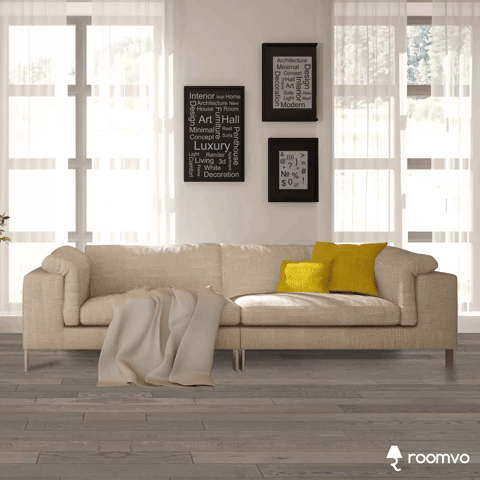
roomvo
Visualize Flooring In Your !
Roomvo makes picking new floors easy. Take advantage of our room visualizer tool to see what your home will look like with any flooring products from our catalog. Just upload your photo to see your room come to life.
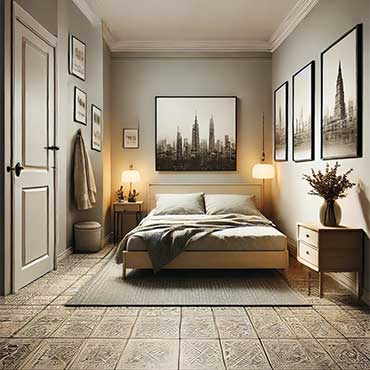 Blog
BlogModern Bedroom - Ceramic Tile
Ceramic Tile in Modern Bedrooms: Design and Practicality Explored
This blog post, authored by Arabella Whitethorn, delves into the suitability of for modern bedrooms. Combining functionality with aesthetic appeal, ceramic tile offers unique benefits like durability, eco-friendliness, and design versatility. However, its hard texture and cold feel may require creative layering to ensure comfort.
Targeting interior designers and decorators, the post provides comprehensive insights into nine key considerations, from style coherence to soundproofing. The result is a nuanced discussion, helping professionals assess whether ceramic tile aligns with their modern bedroom design goals.
Learn More Blog
BlogModern Kitchen - Contemporary Rugs
Modern Rugs in the Kitchen: Design Inspiration for Interior Designers
Modern kitchens blend functionality with style,serving as both a workspace and a social hub. This blog post explores the roleof modern Modern in enhancing these spaces, providing interior designers withinsights into their design impact. The article covers key considerations likedurability, moisture resistance, and budget, emphasizing the practicality andaesthetic value rugs bring to modern kitchens.
With their clean lines, bold patterns, and versatile materials, modernrugs offer a unique opportunity to elevate kitchen interiors. The blog providesactionable advice on selecting the right rug, ensuring it aligns with thekitchen’s purpose and modern design elements, while addressing practicalconcerns like maintenance and eco-friendliness.
Learn More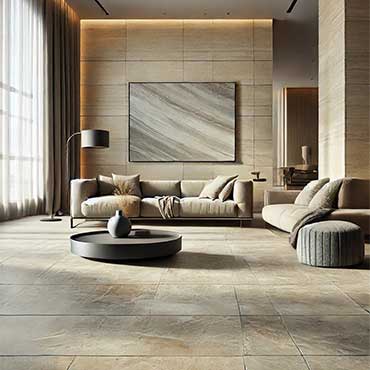 Blog
BlogModern Living Room - Limestone Tile Flooring
Limestone Tile Flooring in Modern Living Rooms: Timeless Elegance Redefined
Arabella Whitethorn's blog post delves into the transformative potential of limestone tile flooring in modern living rooms. Focusing on its timeless aesthetic, durability, and eco-friendliness, the article offers detailed insights for interior designers and decorators. Examining nine key considerations, including design style, durability, and budget, it provides a comprehensive guide to determining whether limestone tile flooring is the right choice for your projects.
Readers will discover the pros and cons of limestone tiles and how they influence factors like comfort, room size perception, and health. Designed to inspire and inform, the post highlights limestone’s ability to enhance modern living room decor, making it a sophisticated yet practical flooring option for discerning clients.
Learn More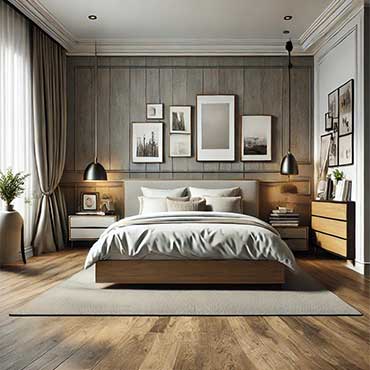 Blog
BlogModern Bedroom - Luxury Vinyl Flooring
Transform Modern Bedrooms with Luxury Vinyl Plank Flooring
Luxury () offers an exceptional blend of beauty and functionality, making it an ideal choice for modern bedrooms. This article explores the many ways LVP enhances bedroom design, from its realistic wood-like finishes to its practical benefits, such as durability, moisture resistance, and soundproofing. Designed for Interior Designers and Decorators, it provides a comprehensive guide on how LVP aligns with modern design principles while addressing practical considerations like budget, comfort, and eco-friendliness.
By integrating LVP into a modern bedroom, designers can create a harmonious balance between aesthetics and functionality. Whether crafting a serene retreat with light-toned flooring or adding warmth with deeper hues, LVP provides endless design possibilities. Its resilience and low maintenance make it an attractive option for clients seeking stylish yet practical flooring solutions. This blog post serves as both inspiration and a resource for professionals aiming to elevate their design projects with the perfect flooring choice.
Learn More
